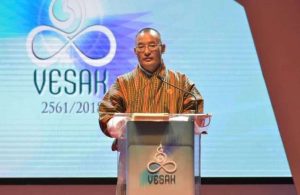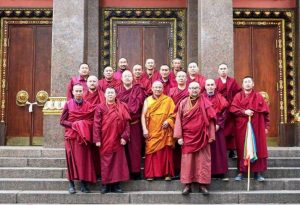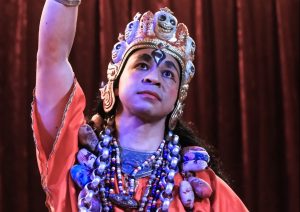
Geshe Kelsang Gyatso, a Tibetan monk and founder of the New Kadampa Tradition (NKT), died on 17 September, aged 91. Kelsang Gyatso is well known for guiding the NKT’s rapid growth around the world and for his prolific writing, authoring some 25 books over the course of his lengthy career.
Kelsang Gyatso was also at the center of widening rift after breaking off from the Gelug tradition of His Holiness the Dalai Lama and forming the NKT in 1991, and later as members of the NKT organized vocal protests of the Dalai Lama during his visits to the UK.
Kelsang Gyatso’s death was announced on the Modern Kadampa Buddhism website:
On September 17 our most precious Spiritual Guide Venerable Geshe Kelsang Gyatso Rinpoche showed the manner of passing peacefully into the clear light.
Venerable Geshe-la requested that for auspiciousness at this time all Kadampa centers around the world engage in a short retreat using his special prayer, Request to the Holy Spiritual Guide Venerable Geshe Kelsang Gyatso Rinpoche from his Faithful Disciples.
Manjushri KMC, the Mother Center, will close on Tuesday 20 and Wednesday 21 to engage in this retreat.
You who take on the great responsibility of caring in every way for the doctrine and migrators,
(Modern Kadampa Buddhism)
Giving to everyone equally, without discrimination, the precious opportunity to accomplish one’s own purpose and the purpose of others;
O Guru Sumati Buddha Heruka,
Please remain at my heart forever,
So that all directions will be pervaded by your matchless, excellent deeds.
In an update dated 19 September, the following was added:
During his remarkable life, Venerable Geshe Kelsang Gyatso Rinpoche touched the hearts of countless people throughout the world.
His wisdom, kindness and compassion are unequalled in these uncertain times.
As we will see in coming articles, Venerable Geshe-la’s legacy is both extraordinary and world-changing.
From his vast body of unequalled teachings enshrined in his extraordinary books, the Temples, centers, study programs, Teachers, Sangha and above all the international community of people actively dedicated to world peace, he has sown so many seeds of peace and hope in this troubled world that are already bearing fruit and will continue to do so for many decades to come.
Venerable Geshe-la frequently said to us “The time will come for you to do my job.” And so now this time is upon us – to joyfully and sincerely work together to fulfill the compassionate wishes of this holy being in generation after generation.
This will be our highest offering to Venerable Geshe-la and our deepest expression of gratitude.
(Modern Kadampa Buddhism)
Kelsang Gyatso was born Lobsang Chuponpa in Tibet in 1931. At the age of eight, he joined Ngamring Jampa Ling Monastery and was ordained as a novice monk under the name “Kelsang Gyatso” (Ocean of Good Fortune). From there, he continued his studies and joined the many tens of thousands of Tibetans leaving to India in 1959. In India, Kelsang Gyatso engaged in further studies and intensive retreats in the Himalayan foothills.
In 1976, Kelsang Gyatso was invited by the head teachers of the Foundation for the Preservation of the Mahayana Tradition (FPMT), Lama Thubten Yeshe and Lama Zopa Rinpoche, to teach at the Manjushri Institute, which Lama Yeshe had founded in England in 1975.
Beginning in 1978, a disagreement between Kelsang Gyatso and other members of the Manjushri Institute arose, eventually leading to Kelsang Gyatso’s takeover of the center. Over the ensuing years, Kelsang Gyatso distanced himself from the FPMT, and in 1991 founded the New Kadampa Tradition, signaling a clear break from the Gelug tradition and FPMT. In 1992, Kelsang Gyatso stopped giving regular teachings at the Manjushri Institute, although he continued his duties as spiritual director and his work as an author.
Over the course of his career, Kelsang Gyatso maintained devotion to the “Dharma protector” entity Dorje Shugden. Over the same period, the Dalai Lama and other ecumenical Gelug teachers distanced themselves from and eventually cut off devotion to Shugden. They asserted that Shugden devotion was sectarian and opposed to other schools of Tibetan Buddhism. During this period for the Tibetan diaspora, these teachers and many from other schools of Tibetan Buddhism wished to emphasize unity.
Since the rift emerged, the NKT, which was renamed the New Kadampa Tradition – International Kadampa Buddhist Union (NKT–IKBU) in 2003, has continued to grow. Kelsang Gyatso stepped down from his role as spiritual director of the NKT–IKBU in August 2009. From 2013 until his death, he made no public appearances and did not respond to media inquiries.
See more
Important Announcement: Venerable Geshe Kelsang Gyatso Rinpoche (Modern Kadampa Buddhism)
A Quiet Humble Monk Who Changed Our World (Modern Kadampa Buddhism)
Geshe Kelsang Gyatso (Tibetan Buddhism in the West)
Two Sides of the Same God (Tricycle Magazine)
BBC Documentary: “An Unholy Row” (1998) (Tibetan Buddhism in the West)
‘Extremist’ sect threatens protests against Dalai Lama during UK visit (The Guardian)
Related news reports from BDG
Britain’s Prince Harry Reportedly Tells Buddhist Monk About Daily Meditation Practice
Buddhist Reformer B. R. Ambedkar to be Honored with New Statue at Temple in England
Triratna Buddhists in York, England, Plan for Expansion
Buddhist Monastery in England Plans Expansion
Related features from BDG
Abstract Meditations and Artistic Contemplation, with Françoise Issaly
The Exclusivism of the New Kadampa Tradition: The French Example
Buddhism Today and Tomorrow: Challenges and Prospects













Thank you Justin for this article.
I‘d like to add a brief remark, the loud – in the literal sense noisy (with megaphones) protests – were performed all over the world, not only in the UK; e.g. Australia, the US, France, Germany, Switzerland …